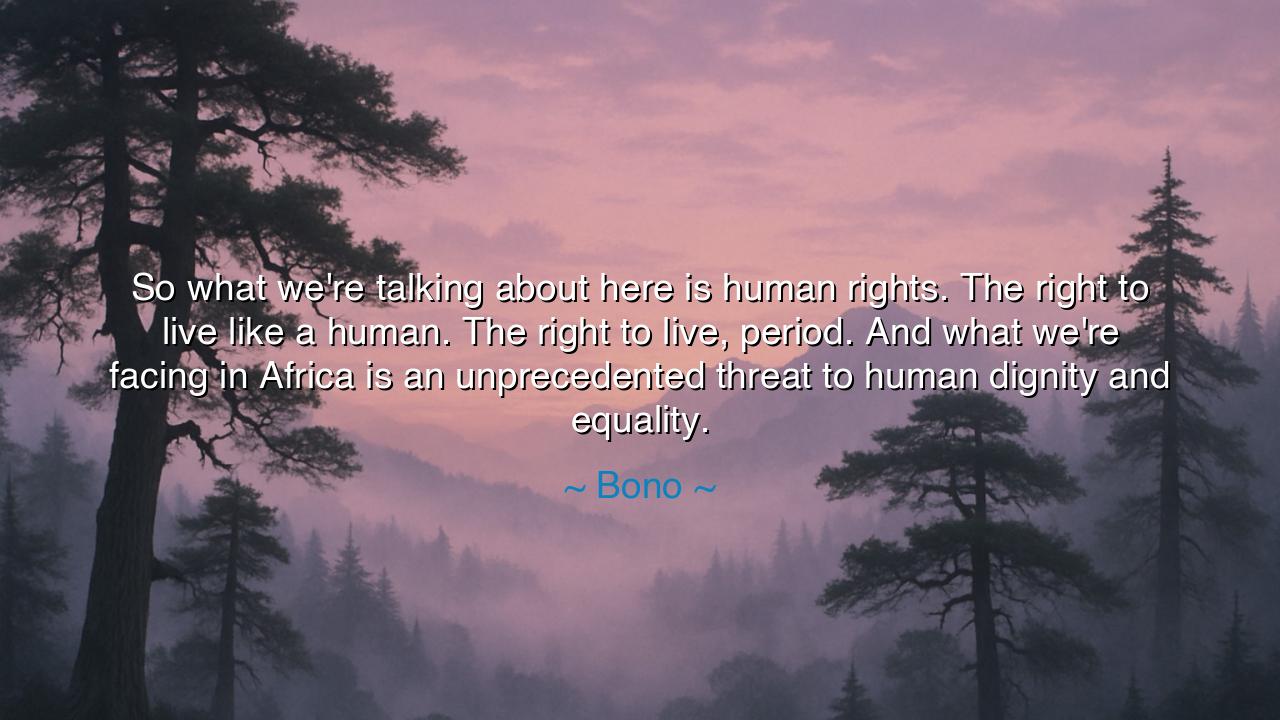
So what we're talking about here is human rights. The right to
So what we're talking about here is human rights. The right to live like a human. The right to live, period. And what we're facing in Africa is an unprecedented threat to human dignity and equality.






In the words of Bono, artist, activist, and voice for the voiceless, we hear a cry that transcends music and politics alike: “So what we're talking about here is human rights. The right to live like a human. The right to live, period. And what we're facing in Africa is an unprecedented threat to human dignity and equality.” These words, though spoken in our modern age, echo with the gravity of the prophets and philosophers of old. They remind us that before nations, before laws, before wealth, there stands the sacred truth of human dignity—the right not only to survive, but to live as beings of worth, with hope and purpose.
To understand the meaning of this quote, we must hear it as more than a call to aid a continent—it is a mirror held before all of humanity. Bono speaks not just of Africa’s suffering, but of the condition of mankind itself, for whenever one region of the world is consumed by poverty, disease, or despair, the whole human family is diminished. His words awaken an ancient moral law: that the measure of civilization is not in its riches or its empires, but in how it treats the least among its people. To live like a human is not merely to draw breath, but to live free from degradation, hunger, and silence—to be able to dream, to love, and to rise.
The origin of Bono’s conviction lies in the long shadow of injustice that has fallen upon the world’s poor, and particularly upon the continent of Africa. There, history has seen chains of slavery replaced by chains of debt, and empires replaced by exploitation in new forms. In the early 2000s, when Bono spoke these words, he was not only a musician but a messenger. He saw the suffering wrought by HIV/AIDS, famine, and political corruption, and he sought to awaken the conscience of powerful nations. Through campaigns like Live 8 and the ONE Campaign, he used his fame to summon kings and presidents, not to praise him, but to listen to the cries of the dying. His quote stands as a torch of conscience, lit against the darkness of indifference.
Throughout history, there have always been voices like his—souls who refused to turn away from suffering. In the age of empire, there was William Wilberforce, who fought against the slave trade when profit drowned out pity. In the last century, there was Nelson Mandela, who rose from the depths of imprisonment to declare that freedom and equality were not privileges, but rights bestowed upon every human being by birth. And in our own time, Bono stands among them as a bridge between art and activism, proving that music, too, can become a weapon of peace. Like the poets of antiquity, he reminds us that beauty and justice spring from the same well—the yearning of the soul for harmony.
Yet Bono’s words do not belong only to leaders or heroes. They speak to the everyday citizen, for the threat to human dignity does not vanish when the news cameras move on—it lingers in forgotten villages, in refugee camps, in the hearts of those who feel unseen. He warns us that bigotry and inequality are not bound by geography; they are seeds that can grow anywhere if left unchecked. The “unprecedented threat” he describes is not only famine or war, but the apathy of a world that has learned to look away. His message, therefore, is both a call and a challenge: if we cherish our own humanity, we must defend it wherever it is denied.
The lesson in his words is clear: human rights are not the gift of governments—they are the birthright of all. To safeguard them, one must act—not only through grand gestures, but through daily choices. Give voice to the voiceless. Share knowledge, wealth, and compassion with those in need. Support leaders and policies that uplift rather than exploit. Understand that equality is not charity—it is justice. When one human being is denied the right to live fully, we are all diminished, for humanity is one body, and suffering in one limb weakens the whole.
Therefore, let Bono’s declaration be carried like a sacred scroll through time: “The right to live like a human. The right to live, period.” Let it remind us that life without dignity is a shadow of existence, and that to defend another’s life is to honor our own. The task before us is not small, but eternal—to resist the cold indifference of the age, to remember that compassion is strength, and that true civilization is measured not by power, but by mercy. Stand, then, as guardians of that flame of human equality, for when we protect the dignity of others, we preserve the very soul of mankind.






AAdministratorAdministrator
Welcome, honored guests. Please leave a comment, we will respond soon